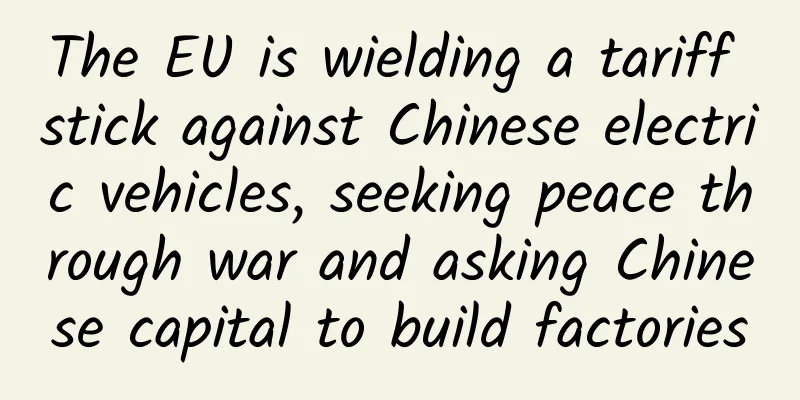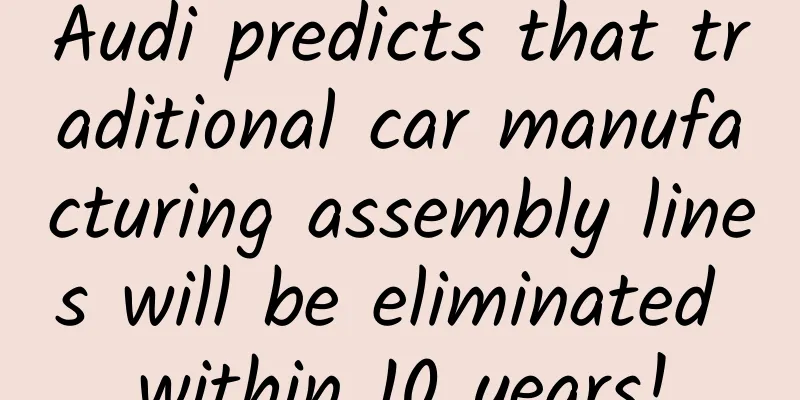The EU is wielding a tariff stick against Chinese electric vehicles, seeking peace through war and asking Chinese capital to build factories

|
The EU's imposition of punitive tariffs on Chinese electric vehicles has taken a new turn. On June 22, China and the EU agreed to start consultations on this matter. At the same time, German Vice Chancellor Habeck visited China. During his stay in China, he explained and emphasized to the Chinese side on many occasions that the EU's temporary tariffs on Chinese electric vehicles are not punitive and that both sides still have room for maneuver. According to German media reports, Habeck summarized the visit as "very satisfying". Deutsche Presse-Agentur even published an article saying that China and Europe have reached a "preliminary settlement" in the electric vehicle tariff dispute. Influenced by this news, the European auto sector rose sharply. Interestingly, Habeck is the leader of the German Green Party and has always maintained a tough stance towards China, but judging from a series of statements he made during this visit, it seems like he has got the wrong script. The dispute between China and the EU has actually taken such a turn, which is beyond the expectations of the outside world. In fact, when the EU issued this policy, it repeatedly emphasized that the two sides can still communicate. So why did this dispute take such a turn? To understand this, we must first understand two key issues.
In the field of electric vehicles, China's advantage is so great that the EU can no longer catch up on its own. Imposing tariffs can increase the operating costs and terminal retail prices of Chinese manufacturers, reduce the competitiveness of Chinese electric vehicles, and thus give EU electric vehicle manufacturers some breathing space. It is almost a consensus in the EU industry that if there are no restrictions on Chinese electric vehicles, EU manufacturers will be powerless to fight back against Chinese manufacturers. Musk also said before that the only thing that can stop Chinese electric vehicles is trade barriers. Why is the EU’s attitude so conflicted? Unlike the United States, the EU's attitude towards the issue of tariffs on Chinese electric vehicles is quite conflicted. On the one hand, it is wielding the tariff stick, and on the other hand, it keeps making it clear that "this matter is negotiable." The root of the EU's attitude is that it wants to strengthen cooperation with China's new energy vehicle industry and use temporary tariffs to force Chinese automakers to go to Europe, invest in factories and share technology. In short, the EU's appeal is three words: seeking investment. Thirty years in the east, thirty years in the west. The EU is well aware of the technological gap between its own new energy vehicle industry and China, so it has imposed tariffs to encourage Chinese manufacturers to invest in the EU and transfer technology. In just over 20 years, the positions of China and the EU in the automotive field have reversed. So, why does the EU think it can reach an agreement with China in this way? The reason is not complicated. The EU itself is very clear that even if tariffs are imposed, it will not have a substantial impact on the business of Chinese manufacturers in the EU. Cui Dongshu, secretary-general of the China Passenger Car Association, and others believe that even according to the EU's adjusted tariff policy, the average tax rate will only be around 20%. As the scale of China's new energy manufacturers continues to expand and costs continue to decline, the costs brought by the EU's increased tariffs will not have a substantial impact on their profitability. The BYD Song PLUS is priced at about 20,000 euros in China, but as high as 42,000 euros in the EU. The profit of each Song PLUS in China is about 1,300 euros, and the profit in the EU market is as high as 14,300 euros. The profit difference is about 10 times, and the tariff of about 20% does not have much impact. To sum up, the EU's attitude on this issue is: we all want to develop electric vehicles, but you are too strong. If I don't restrict you, you will completely destroy my electric vehicle industry, so I have to defend myself. My self-defense will hurt you, but the damage will not be great. At most, it will make you earn less. So we can sit down and talk, please understand. In addition, the EU has also grasped another mentality of Chinese new energy manufacturers: they originally wanted to invest in the EU to set up factories and develop localization. Imposing tariffs will accelerate the localization process of Chinese manufacturers in the EU. BYD's first new energy vehicle factory in Europe has settled in Hungary, and countries around the world are vying for BYD's next investment opportunity; Xiaopeng Motors has expressed its intention to invest and build a factory in the European Union, and the implementation is expected to be accelerated; Chery has established a joint venture in Spain and acquired Nissan's production base in Spain to produce electric vehicles; SAIC has decided to introduce China's green factories to Europe. I don't know how BYD and other overseas manufacturers reacted to the EU's tariff policy, but it is likely that they responded like this: You just want to form a joint venture? Why are you so angry? You also asked us to fill out tons of documents, blatantly peeping at our technology, and you just asked us to fill in our bank account passwords. Therefore, negotiations between China and Europe on electric vehicle tariffs will continue, and some dramatic scenes are expected. Moreover, no matter what the outcome of the negotiations is, the possibility of a complete decoupling between China and Europe is unlikely. It should be noted that the EU is always arguing and its foreign policy is also changing frequently. This time, Germany and France have obvious differences in imposing tariffs on Chinese electric vehicles. Therefore, although the general direction of China-EU electric vehicle cooperation remains unchanged, Chinese new energy vehicle manufacturers still need to pay attention to policy risks. As a winner of Toutiao's Qingyun Plan and Baijiahao's Bai+ Plan, the 2019 Baidu Digital Author of the Year, the Baijiahao's Most Popular Author in the Technology Field, the 2019 Sogou Technology and Culture Author, and the 2021 Baijiahao Quarterly Influential Creator, he has won many awards, including the 2013 Sohu Best Industry Media Person, the 2015 China New Media Entrepreneurship Competition Beijing Third Place, the 2015 Guangmang Experience Award, the 2015 China New Media Entrepreneurship Competition Finals Third Place, and the 2018 Baidu Dynamic Annual Powerful Celebrity. |
>>: Apple Watch waterproof test: Amazing!
Recommend
Using Internet thinking to see LeTV TV's breakthrough in 4K
Nowadays, "Internet thinking" has becom...
#千万IP创科普# Emergency Science Popularization | Picture caption: Do you know these precautions after a typhoon?
Emergency Science | Illustration: Do you know the...
Practical explanation | Don’t you know how to use Tik Tok feed flow to attract traffic in your live broadcast room?
In this year of fear, disaster, and magic, a sudd...
When will Shenyang be unsealed in 2022? When will things return to normal? Attached is the latest news on the epidemic
Recently, local epidemics have been reported in ma...
As soon as I mentioned a certain product, I received a push notification. Are we being eavesdropped? | Expo Daily
Your best "insider" in the scientific c...
Do you feel dizzy when you stand up after squatting for a long time? It may not be hypoglycemia! This disease is very common →
Have you ever had Such experience After squatting...
Mengmanren’s “Tutorial on Making Trivia Animation Short Videos with Mobile Phone” is easy for beginners to follow!
Course Contents: 1. Analysis and Monetization Log...
How to shoot video ads for the education industry using Tencent social advertising?
Since the second quarter of 2018, the education i...
Cool Shell Review: Unified appearance and "coupled" functions are far from enough
Some time ago, the news that the iPhone can be di...
Why do some glues fall off easily, while others are as good as welding?
Why can glue be used to stick things together? Of...
What do ROI, CPA, CPC, and OCPM mean in SEM promotion?
In every industry, there are unique professional ...
Introduction to HIDL for Android hardware communication
1. Introduction HIDL stands for HAL interface def...
Nut Pro review: More innovative than iPhone, the most worthwhile Hammer phone to buy in five years
How to integrate the almost paranoid spirit of cr...
Order cuts, stock price plunges, Apple adjusts strategy this winter
***According to reports, Apple stock has official...
Don’t think you wash your hair all the time, the wrong method can easily lead to hair loss! How many of these 5 common misunderstandings have you made?
Many friends will ask, why does the wrong posture...









